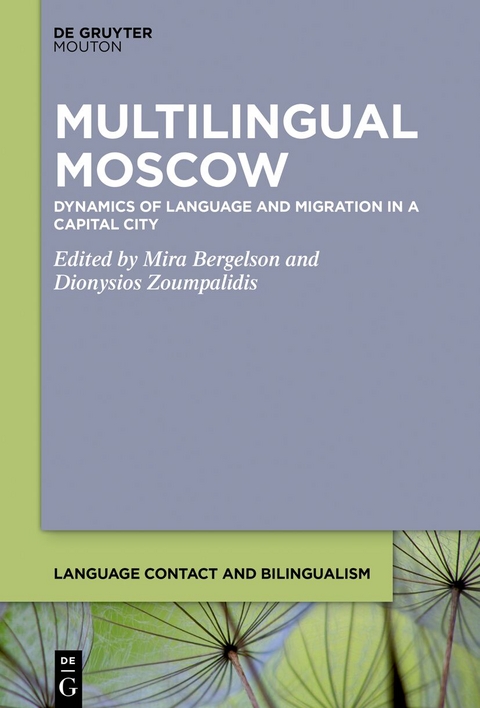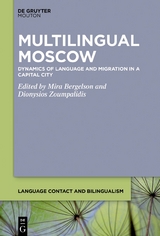Multilingual Moscow
Dynamics of Language and Migration in a Capital City
Seiten
2024
de Gruyter Mouton (Verlag)
978-3-11-075111-6 (ISBN)
de Gruyter Mouton (Verlag)
978-3-11-075111-6 (ISBN)
This series offers a wide forum for work on contact linguistics, using an integrated approach to both diachronic and synchronic manifestations of contact, ranging from social and individual aspects to structural-typological issues. Topics covered by the series include child and adult bilingualism and multilingualism, contact languages, borrowing and contact-induced typological change, code switching in conversation, societal multilingualism, bilingual language processing, and various other topics related to language contact. The series does not have a fixed theoretical orientation, and includes contributions from a variety of approaches.
Moscow is one of the largest cities in Europe. Over the last three decades, the linguistic, cultural, and religious diversity in the Russian mega-city has increased substantially. On the other hand, language policy and language situation received little or no academic attention. The collection is closing this gap in the literature and investigates the urban multilingual practices in Moscow. A particular focus is placed on the investigation of multimodal interactions within minority groups. Ideologies about language play an important role in how communities form and differentiate themselves from others. Interestingly, the book unearths significant ideological views held about language varieties spoken in Moscow. The collection offers interdisciplinary contributions from areas such as education, intercultural communication, migration studies, geography, ethnography of communication, and community practitioners. In sum, the reader benefits from an insightful introduction to the complex linguistic situation in the dynamic capital of Russia.
Moscow is one of the largest cities in Europe. Over the last three decades, the linguistic, cultural, and religious diversity in the Russian mega-city has increased substantially. On the other hand, language policy and language situation received little or no academic attention. The collection is closing this gap in the literature and investigates the urban multilingual practices in Moscow. A particular focus is placed on the investigation of multimodal interactions within minority groups. Ideologies about language play an important role in how communities form and differentiate themselves from others. Interestingly, the book unearths significant ideological views held about language varieties spoken in Moscow. The collection offers interdisciplinary contributions from areas such as education, intercultural communication, migration studies, geography, ethnography of communication, and community practitioners. In sum, the reader benefits from an insightful introduction to the complex linguistic situation in the dynamic capital of Russia.
Dionysios Zoumpalidis and Mira Bergelson, National Research University, Moscow, Russia.
| Erscheinungsdatum | 01.02.2024 |
|---|---|
| Reihe/Serie | Language Contact and Bilingualism [LCB] ; 22 |
| Zusatzinfo | 13 col. ill., 17 b/w tbl. |
| Verlagsort | Berlin/Boston |
| Sprache | englisch |
| Maße | 155 x 230 mm |
| Gewicht | 413 g |
| Themenwelt | Geisteswissenschaften ► Sprach- / Literaturwissenschaft ► Anglistik / Amerikanistik |
| Geisteswissenschaften ► Sprach- / Literaturwissenschaft ► Sprachwissenschaft | |
| Schlagworte | Identität • Identity • Mehrsprachigkeit • minority language education • Moscow Multilingualism • Moscow Multilingualism, Russian Language Policy, Minority Language Education, Identity • Russian Language Policy • Russland • Sprachpolitik |
| ISBN-10 | 3-11-075111-9 / 3110751119 |
| ISBN-13 | 978-3-11-075111-6 / 9783110751116 |
| Zustand | Neuware |
| Informationen gemäß Produktsicherheitsverordnung (GPSR) | |
| Haben Sie eine Frage zum Produkt? |
Mehr entdecken
aus dem Bereich
aus dem Bereich
Poetik eines sozialen Urteils
Buch | Hardcover (2023)
De Gruyter (Verlag)
59,95 €
Buch | Softcover (2024)
belleville (Verlag)
20,00 €




